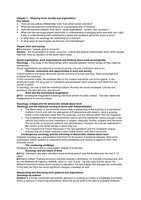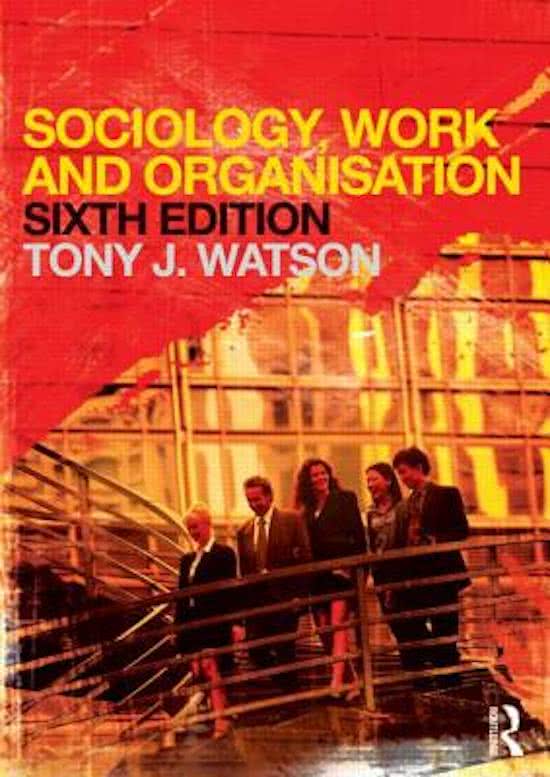Chapter 1 – Studying work, society and organization
Key issues
How can we usefully differentiate ‘work’ from other human activities?
What are the essential characteristics of a sociological way of thinking?
How can we most helpfully think about ‘social organisation’, ‘society’ and ‘societies’?
What role has sociology played historically in understanding a changing world and what role might
it play in understanding both contemporary issues and questions about the future of work?
In what ways can sociology be understood as a science?
In what ways do sociologists use theories and methodology?
People, work and society
Glucksmann: “people work to consume”.
Society = the broad pattern of social, economic, cultural and political relationships within which people
lead their lives as members of the same nation-state.
Social organization, work organisations and thinking about work sociologically
Sociology = The study of the relationships which develop between human beings as they organize
themselves.
Social organizations are patterns of social structures, cultures, institutions and so on.
Choices, constraints and opportunities in work and society
Cultural patterns and social structures are the outcome of human activities, these encourage and
constrain the individual.
In the voluntarist model, the emphasis lies on the creative and active role of the agents. In the
structured model, the focus lies on institutions and processes which constrain and determine the
course of action.
In sociology, we look at how the individual actions influence the social processes, cultures and
structures, but also the other way around.
Work and the sociological imagination
Mills: “sociological imagination is placing individual actions in public context”. This also means the
disappearance of common sense.
Sociology, critique and the democratic debate about work
Sociology and the historical coming to terms with industrialization
The Reformation in the sixteenth century saw a questioning of the authority of a centralized
Catholic Church and, with the emergence of Protestantism and dissent, came a growing
stress on the individual rather than the corporate, and the rational rather than the traditional.
The Enlightenment in the late seventeenth century and the eighteenth century brought under
rational and critical scrutiny institutions of religion, inequality, kinship, property and monarchy.
The focus lies on empirical research and rationalization. Humans can only be understood in
the context of the whole society in which they live.
The Industrial and French Revolution in the late eighteenth and the nineteenth century
ensured that all of these institutions were further shaken and often overturned.
Contemporary sociology and the informing of democratic choices about work
Industrial sociology as a manipulative instrument for the pursuit of sectional interests. Alternative
sociologists helped workers to understand other possibilities and choices in regard to work, they
informed choice.
The continuing challenge
Nowadays, the focus lies on consumption instead of production.
Sociology and the future of work
White: “Decisions and plans will affect every working person, and the families over the next 5-10
years”.
Williams critique: Pushing economic activities towards a dichotomy, for example a bureaucracy, and
an one-dimensional trajectory towards –ation or –ism or post-. He also says that we ignore the
different dimensions along which transitions take place. He also argues that changes are continuities
of the past, but there are some significant changes nowadays as well.
Researching and theorizing work patterns and experiences
Sociology as science
Science is a formal, systematic and precise approach to building up a body of knowledge and theory
which is rigorous in examining propositions about the social world in the light of available evidence.





